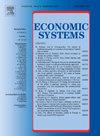欧盟前国家社会主义国家中有多少人被抛在后面的比较分析
IF 3.3
2区 经济学
Q1 ECONOMICS
引用次数: 0
摘要
本文考察了来自欧盟中欧和东欧(CEE)国家的前国家社会主义国家的个人与来自西欧(WE)国家和中东欧集团内各国的其他欧盟个人相比落后的程度。为此,将模糊方法应用于由收入、物质剥夺和工作强度组成的多维设置,以衡量2030年可持续发展议程的“不让任何人掉队”(LNOB)原则。在2007-2019年期间,这两个国家集团之间存在一定的趋同过程,原因是中东欧国家的个人落后水平有所下降,而在2007-2008年金融危机之后的几年里,西欧国家的个人落后水平有所上升。中东欧国家之间的个体落后程度也存在显著的跨国差异,这与这些国家建立的后社会主义资本主义模式不同以及加入欧盟后的发展有关。本文章由计算机程序翻译,如有差异,请以英文原文为准。
A comparative analysis on how much individuals are left behind in the former state socialist countries of the European Union
This paper examines the extent to which individuals from the former state socialist countries of the EU’s Central and Eastern European (CEE) countries have been left behind compared to the rest of EU individuals from Western European (WE) countries and across countries within the CEE bloc. To this end, a fuzzy approach is applied to a multidimensional setting made up of income, material deprivation, and work intensity to measure the ‘Leaving no one behind’ (LNOB) principle of the 2030 Sustainable Development Agenda. A certain process of convergence is found between both blocs of countries over the period 2007–2019 due to a decrease in the level individuals were left behind in the CEE countries, as well as an increase in the level individuals were left behind in the WE countries in the years following the 2007–2008 financial crisis. Significant cross-country disparities in the degree individuals lag behind are also revealed among the CEE countries related to the different models of post-socialist capitalism established in these countries and their subsequent development after joining the EU.
求助全文
通过发布文献求助,成功后即可免费获取论文全文。
去求助
来源期刊

Economic Systems
ECONOMICS-
CiteScore
4.90
自引率
0.00%
发文量
83
审稿时长
48 days
期刊介绍:
Economic Systems is a refereed journal for the analysis of causes and consequences of the significant institutional variety prevailing among developed, developing, and emerging economies, as well as attempts at and proposals for their reform. The journal is open to micro and macro contributions, theoretical as well as empirical, the latter to analyze related topics against the background of country or region-specific experiences. In this respect, Economic Systems retains its long standing interest in the emerging economies of Central and Eastern Europe and other former transition economies, but also encourages contributions that cover any part of the world, including Asia, Latin America, the Middle East, or Africa.
 求助内容:
求助内容: 应助结果提醒方式:
应助结果提醒方式:


